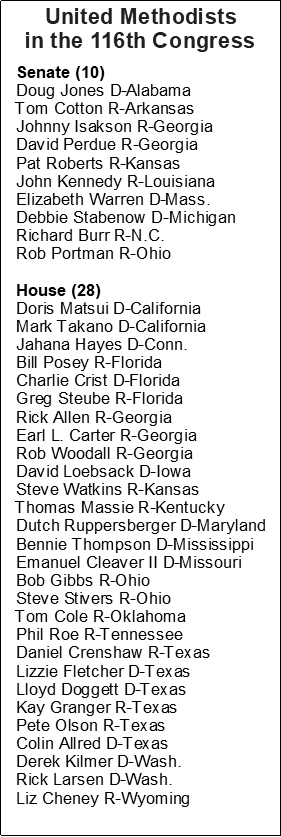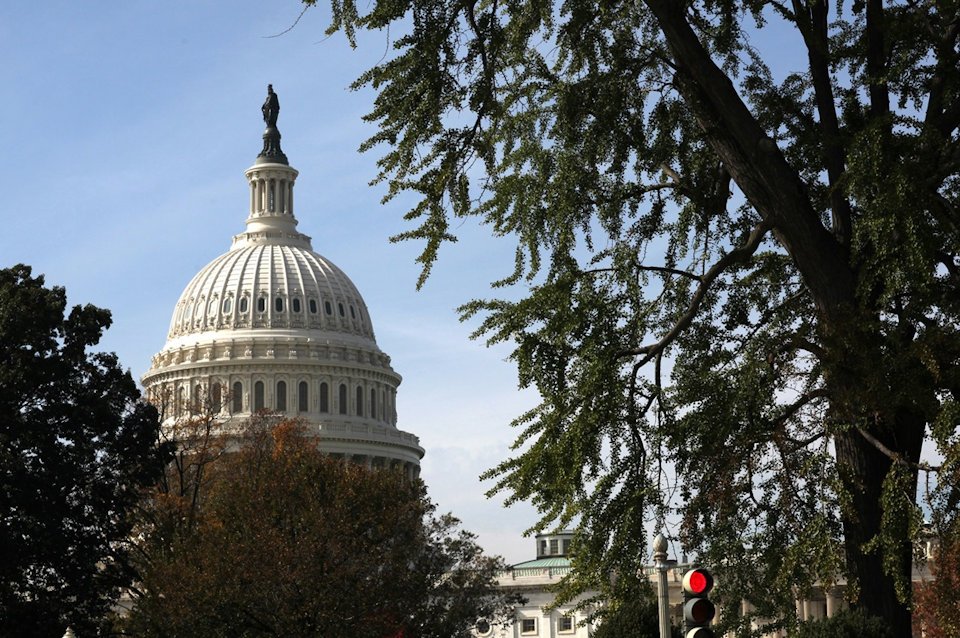Faith informs governance. This listing of Congressional religious affiliation shows that the 116th Congress is slightly more diverse.
ALBERT J. MENENDEZ
UM News
The newly started 116th Congress has 38 United Methodists among its members. That marks a decline of two from the 115th Congress.
There are ten United Methodists in the Senate, and 28 in the House. They are serving in a Congress with fewer Christians and slightly more religious diversity, including the first two Muslim women ever to serve in Congress.
The United Methodists in Congress include Sen. Doug Jones, Democrat of Alabama, who won a special election in December 2017 and succeeded another United Methodist, Republican and former U.S. Attorney General Jeff Sessions.
Overall, Republican United Methodists outnumber their Democratic fellow church members by 22 to 16. That represents a 9 percent gain over the previous Congress.
Texas has the largest number of United Methodists with six, followed by five from Georgia, and three each from Florida and Ohio. Twenty-two states have at least one United Methodist member. Both U.S. Sens. Johnny Isakson and David Perdue of Georgia are United Methodist Republicans.
Six of the newly elected House members are United Methodists. The new Democrats include Jahanna Hayes of Connecticut, and Lizzie Fletcher and Colin Allred, both of Texas. The new Republicans are Greg Steube of Florida, Steve Watkins of Kansas and Daniel Crenshaw of Texas.
They are coming to a Congress that has seen a modest decline in members identifying as Christians — from 91 percent in the 115th to 88 percent in the 116th. According to Pew Research Center, Christians as a whole are still over-represented in Congress compared to their share of the U.S. population.
By far, the biggest difference between congress members’ religious affiliation and that of the general population is the share who don’t identify with a religious group. According to Pew, 23 percent of Americans say they are atheist, agnostic or “nothing in particular.”
In Congress, newly elected Sen. Kyrsten Sinema — a Democrat from Arizona — is the only person who identifies as religiously unaffiliated. However, 18 members — up from 10 in the 115th Congress — declined to specify their faith group. All the unspecified are Democrats.
Among non-Christians are four additional Jewish members, who bring the Jewish share of the new Congress to 30 members, or 6 percent. Congress has three Buddhists, three Hindus, two Muslims and one Unitarian Universalist.
United Methodists are in fourth place in congressional religious affiliations, behind first-place Roman Catholics and second-place “unspecified” Protestants and third-place Baptists.
United Methodists also sit in three governors’ mansions. They include Kim Reynolds, Republican in Iowa; Phil Bryant, Republican in Mississippi; and Tom Wolf, Democrat in Pennsylvania.
A United Methodist, re-elected Sen. Elizabeth Warren of Massachusetts, also is running for president.
Last Updated on September 20, 2022

